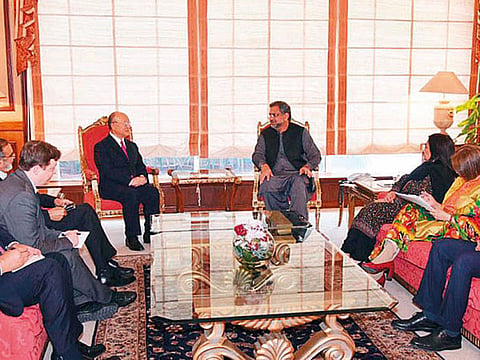IAEA chief lauds Pakistan’s nuclear security measures
Amano says impressed by nuclear safety and security standards after visiting Karachi Nuclear Power Plant

Islamabad: International Atomic Energy Agency (IAEA) Director General Yukiya Amano has commended Pakistan’s nuclear safety and security measures.
After visiting Karachi Nuclear Power Plant’s K-3 and K-4 projects on Thursday, Amano praised Pakistan’s impressive nuclear security record over more than four decades and said “Pakistan is completely implementing IAEA guidelines and ensuring nuclear safety and security standards.”
At the site of Karachi Nuclear Power Plant (KANUPP), Amano observed work on the construction of two new reactors and the physical protection measures. The two reactors, due to be completed in 2021 and 2022, will have a combined capacity of over 2,000MW of electricity, nearly 10% of the country’s total production.
Addressing a seminar titled ‘The Peaceful Uses of Nuclear Energy and Pakistan’, the IAEA chief expressed satisfaction that Pakistan is “taking a number of steps for the safety and security of the plants.” The seminar was jointly organised by the Centre for International Strategic Studies (CISS) and the Pakistan Institute of International Affairs (PIAA).
The IAEA chief said that the new KANUPP II and III “plants are very heavily protected” and that the IAEA greatly values cooperation with Pakistan in peaceful uses of nuclear technology.
“Your country [Pakistan] is an experienced user of nuclear technology for peaceful purposes. You have the knowledge; you have the pool of well-trained people to do their job. We [IAEA and Pakistan] have a fruitful two-way relationship,” said the IAEA chief while addressing the seminar.
Detailing everyday uses of nuclear technology in sectors such as industry, agriculture and medicine, he said that 18 hospitals in Pakistan are carrying out treatment of cancer-related diseases and it needs to be extended to the rural areas of the country.
Discussing the role of nuclear power in meeting the future electricity needs of the country, Amano said: “Energy is indispensable for development. Nuclear power can help address challenges as it is low-carbon energy.”
The IAEA chief observed that the centre of nuclear power was shifting from the global North to the South, from Europe to Asia, to China, India, and Pakistan. “Access to nuclear power should not be limited to developed countries; developing countries should also have access to it.”
PIIA chairperson Dr Masuma Hassan, Director General Security Division of CISS Dr Zafar Ali, Executive Director CISS Ali Sarwar Naqvi and PNIRA Chairman Jamsheed Hashmi also spoke at the seminar. “Pakistan’s relationship with IAEA, that began inception of the agency itself in 1957, has been mutually beneficial,” Ali Naqvi highlighted.
Dr Zafar maintained that “Pakistan has offered to share experience and expertise with other states under IAEA auspices. Pakistan gives highest importance to nuclear safety and security. No pilferage or theft of nuclear material has ever happened in Pakistan.”
Earlier in Islamabad, IAEA chief was briefed by the Chairman of the Pakistan Atomic Energy Commission, Mohammad Naeem, about the steps Pakistan is taking to strengthen nuclear safety.
Amano also held a meeting with Prime Minister Shahid Khaqan Abbasi on March 12. Abbasi praised IAEA for it support to Pakistan for the peaceful use of nuclear energy. Pakistan “is ready to further strengthen its partnership with the IAEA and contribute towards the achievement of the sustainable development goals worldwide,” Abbasi said.
In Faisalabad, Amano inaugurated the food safety laboratory of the Nuclear Institute for Agriculture and Biology and was briefed on the use of nuclear technology in health care and agriculture sectors.
The IAEA launched a four-year project this year to help bring together key institutions in Pakistan to work more closely on the safe, reliable and sustainable operation of nuclear power plants.


